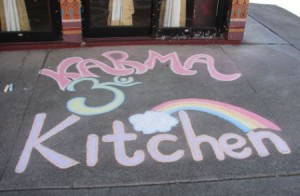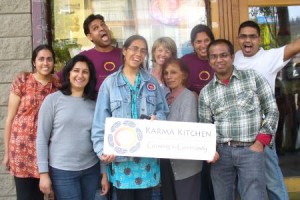Read Stories | Watch Videos
Interview with Richard!
An Interview with Richard Whittaker conducted by Vlad Moskovski
The world is full of restaurants where people come to sit, to enjoy each other’s company, and of course to eat. Karma Kitchen is a little different. As one of the more local projects of Service Space, Karma Kitchen is a restaurant that offers individuals the possibility to be a server one day, and a guest the next. In this radical place, there is more laughing, more cheer, and more spontaneity than in most restaurants. Here one can come alone and leave feeling a part of a big family and an even bigger ideal – to live a life based on the generosity and service to others.
Vlad: What is the basic premise behind Karma Kitchen and how is it different from a regular restaurant?
Karma Kitchen is an experiment in generosity. On the outside it looks like a regular restaurant, but the atmosphere is different; it’s friendlier, there is more human connection in the air and it leads to an elevated and festive atmosphere. It’s really quite wonderful and no two Sundays are the same. Each week the staff people are all volunteers except the cooks who work for the restaurant and get compensated.
Part of the idea is that this is a special experience for the volunteers. As a volunteer, you are serving the food, but you really want to have the feeling that you are connecting with people. In this attentive openness towards a customer, you might learn that someone has just come to town, or they are on their way somewhere. Maybe someone wants to sing a song, or an anniversary has just happened. There’s any number of things that can be revealed, and if something has been discovered about one of the guests that might be shared with the whole restaurant, the waiter might check with the guest and alert the maitre d’. So there’s this additional dimension where all those who are volunteering are alert to hidden possibilities.
Of course, for the volunteer, there’s also the experience of just trying to meet the basic demands of being a good waiter or dishwasher. It just so happens that at the restaurant [Taste of Himalayas], which is where Karma Kitchen is now, there’s a fellow named Juan who is the most extraordinary dishwasher. One time, as a volunteer, I was assigned that task. I was muddling along as best I could wrestling the dirty dishes, spraying them, and loading them into this commercial machine. There were two of us and sometimes we would fall behind. Then Juan would sweep in. We’d have to get out of his way because Juan is known as “The Hurricane.” Seemingly throwing dishes in every direction and making a big racket, but never breaking anything, he’d just completely take care of the whole mess. In the time that it would take me, or any ordinary person, to do 3 or 4 dishes, he’s done 50. It was really amazing.
Watching Juan showed me how much we miss in this culture by overlooking the maestros that exist in every field of endeavor. We celebrate the maestro who is the conductor of the orchestra, but no one like Juan gets celebrated. I watched Juan wash dishes. I actually watched very carefully, and I saw that he had mastered something to such a degree that it deserved my real feeling of respect and honor. So Karma Kitchen is a place in which one has all kinds of fresh impressions, like my impression of Juan. I think it’s because the basic premise is novel and unexpected. It’s really an exploration of what happens when you actually try to act from generosity and service.
Vlad: Why do you think it’s so popular? There is always a line out the door.
Well, you go there and it’s really fun. It’s really rewarding. I’ve met people and had some astonishing experiences as a guest. For instance, I met this woman,Susan Schaller, and heard her story—which is truly amazing. I could not believe I was sitting across from a person with a story that is the equivalent of the Helen Keller story. That’s my most dramatic experience in meeting someone new there. But people love it because it’s really enlivening.
Vlad: So everything is run by volunteers, what do you think motivates people to volunteer their time on a Sunday afternoon to work in a restaurant serving food and washing dishes?
If your wife has been trying to get you to wash dishes for years, and you’ve been resisting that and now you’re volunteering to wash dishes, that’s strange, isn’t it? [laughs] It seems that people are drawn to the possibility of giving something instead of just concentrating to getting something. And those who already have experienced that shift from “myself and what I want” to a focus on giving and sharing with others know the special feeling that can happen. The thing about Karma Kitchen is that it’s like a little laboratory where people are experimenting and trying to put something new into action. I think that’s what draws people. There may be a few people who just go there to get a meal because they don’t have any money and that’s ok, too, because often they end up coming back to volunteer and serve as well.
Vlad: Is the idea of a pay it forward restaurant spreading? I hear about other locations?
Karma Kitchen has been giving rise to some copies of itself. I think there is one in DC, in Chicago, and another one or two in the process of being born. Service Space projects have had a tendency to spread. Karma Kitchen is one of them, and there are several others. I think there’s a widespread interest in service and a feeling among a lot of young people that there has to be a different model from the selfish, capitalistic attitude of “I’m going to get mine and the hell with you.” Many people feel very deeply that something has to change, and that this change has to be in the direction of some kind of service to a greater good.
Service Space projects are like pure versions of this. They’re pretty radical about that, about carrying out their experiments without any focus on the bottom line—without counting the pennies. The interest is in a kind of selfless service. In something that is truly generous.
Vlad: So, they don’t worry about the bottom line?
The truth is that there has to be a certain amount of income or such projects would not keep working. It’s not as though money is ignored. But it’s not worried about—and Karma Kitchen has been more than supporting itself. It almost seems as if there’s a law, that if something is given with certain kind of purity—if something is truly generous—it always causes a reaction of gratitude. And when you feel grateful, the impulse is to give back. So the bottom line takes care of itself.
With Karma Kitchen, there’s not going to be a big worry. If in fact, people were not paying it forward, they would just close it. I don’t think there’s a big commitment to, “We’ve got to keep this going.” Instead, the attitude is “Let’s try this and see if it works. Let’s see what happens.” In Service Space’ philosophy, there is a willingness to fail.
Vlad: I ask the question about the bottom line, because I see this transition happening from a more capitalist model, at least around here in the Bay Area, to being more gift economy, and of course it brings up concerns in those that don’t have complete faith in generosity or in this law that you speak of.
I think you have to verify it. If someone gives something to me, and if it’s a real act of generosity, I know how I feel. I know my impulse and response is that of gratitude and the wish to give back and reciprocate. Karma Kitchen is verifiably functioning. The money comes in—although it may fail in the future. The core people in Service Space, while they are very upbeat and full of hopefulness, have not abandoned their critical judgment. They are all very bright people, who look very carefully at things. They are going to be realistic, but they’re also capable of making these unusual leaps and trying things out. It’s how things can actually be tested rather than just thought about.
Vlad: For me, it really comes down to having faith in something that is very pure, Service Space is very pure around their intentions.
It would seem to me that purity is an ideal. In moments one might experience a pure impulse, and the next moment one may say, “Oh, I see how I could benefit from that, and I want to benefit from that.” There are moments when something actually pure might act through one, but to think that one can be pure—I would be extremely suspicious of that. For a lot of Service Space people, Gandhi is a great exemplar. There is a saying of Gandhi’s that, “if you wait until you are pure before you begin to serve, you will never begin to serve.” You have to start wherever you are and then maybe by following the path of service, you will move in the direction of more purity.
Originally published here. Vlad Moskovski is the author of Involution and a yoga teacher; Richard Whittaker is editor of works & conversations art magazine.
--Vlad Moskovski on Jul 29, 2011
Share Your Own Story
If you have a Karma Kitchen story to share, please email us. We'd love to hear it, and spread the inspiration!




